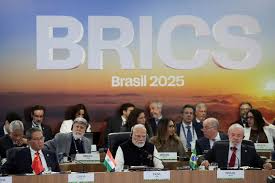BRICS leaders condemn April 22 Pahalgam attack: On terror, zero tolerance

The leaders of BRICS have strongly condemned the April 22 terrorist attack in Pahalgam, Jammu and Kashmir. The attack killed several Indian soldiers when militants ambushed an army convoy in South Kashmir.
BRICS—comprising Brazil, Russia, India, China, and South Africa—issued a joint statement. They called the attack cowardly and reaffirmed a zero-tolerance policy on terrorism. The leaders demanded global cooperation to hold the perpetrators and their supporters accountable.
United in Condemnation
Each BRICS member expressed deep concern and offered condolences to the families of the victims. They agreed that no cause justifies terrorism and called for dismantling support networks for such violence.
“The BRICS nations condemn the Pahalgam attack and pledge to fight terrorism in all forms,” the joint statement declared. “We stand united against violence targeting civilians or soldiers.”
India Leads Call for Accountability
India, which currently chairs BRICS, led the discussion on terrorism. It has long argued that some nations shield or fund terror groups but avoid global scrutiny.
External Affairs Minister S. Jaishankar welcomed the BRICS statement. “Terrorism is terrorism, no matter the motive or location,” he said. He urged the world to shut down terrorist funding, safe havens, and training camps.
China’s Tone Surprises Analysts
Observers noted China’s unexpected alignment with India on this issue. In the past, China has been cautious, especially when statements indirectly referenced Pakistan. This time, however, China did not water down the message.
Though the statement avoided naming countries, its strong tone marked a shift. Experts suggest that China’s regional investments may be driving a tougher stance on instability.
Terrorism as a Global Threat
The BRICS response underscored that terrorism affects all nations, not just those in conflict zones. Leaders from Brazil and South Africa, far from South Asia, still joined the condemnation.
They recognized terrorism as a global challenge that endangers peace, security, and development.
Russian President Vladimir Putin emphasized the need for action. “We must strengthen intelligence sharing and global cooperation,” he said. “This attack reminds us to remain vigilant.”
Diplomatic Pressure on Pakistan
While BRICS did not name Pakistan, the implication was clear. India blames groups like Jaish-e-Mohammed and Lashkar-e-Taiba, believed to operate from Pakistan, for the Pahalgam ambush.
Indian officials say the attack resembles past cross-border assaults. With BRICS support, India now has stronger global backing to highlight this threat.
Strengthening Anti-Terror Cooperation
Following the condemnation, BRICS leaders proposed stronger internal mechanisms to fight terrorism. India suggested forming a BRICS Intelligence Forum to coordinate information and responses.
They also discussed annual reviews of threats and joint counter-terror training programs. These steps could make BRICS a more active force in global security.
Conclusion: No Room for Justification
The BRICS response to the April 22 Pahalgam attack sends a firm message. Acts of terror cannot be justified under any ideology, grievance, or strategy.
India mourns its fallen soldiers, but the world has taken notice. BRICS has shown that emerging powers can lead on global issues—and zero tolerance for terrorism must become the new normal.






